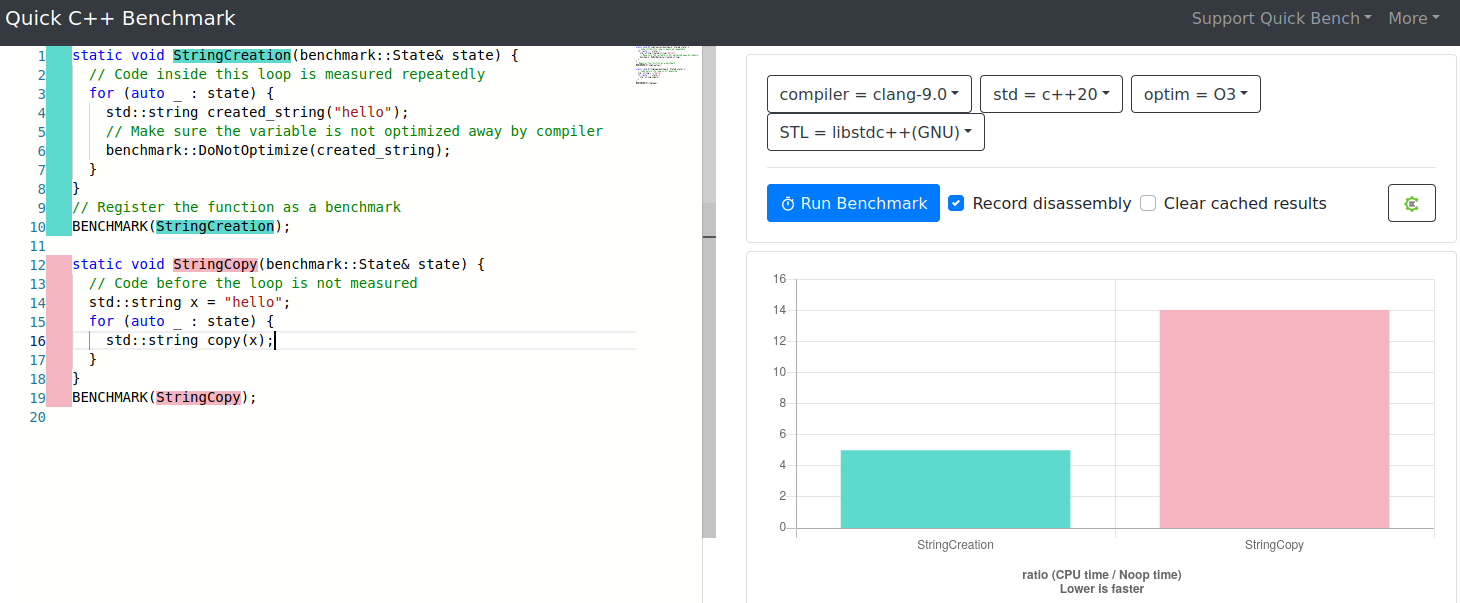facontidavide / Cpp_optimizations_diary
Programming Languages
Labels
Projects that are alternatives of or similar to Cpp optimizations diary
Preface: about me
My name is Davide Faconti and my job is one of the best in the world: I work in robotics.
This blog/repository is maintained in my spare time and it is not related to my work there. Therefore opinions (and memes) are all mine and don't represent my employer in any way.
I love C++ programming and Open Source and this "diary" is my small contribution to the OSS community.
CPP Optimizations Diary
Optimizing code in C++ is something that no one can resist. You can have fun and pretend that you are doing something useful for your organization at the same time!
In this repository, I will record some simple design patterns to improve your code and remove unnecessary overhead in C++.
If you are a seasoned C++ expert, you probably have your own set of rules already.
These rules help you look like a bad-ass/rockstar/10X engineer to your colleagues.
You are the kind of person that casually drops a std::vector<>::reserve before a loop and nods, smiling, looking at the performance improvement and the astonishment of your team member.
Hopefully, the examples in this repository will help you achieve this status of guru and, as a side effect, save the planet from global warming, sparing useless CPU cycles from being wasted.
Then, unfortunately, someone on the other side of the planet will start mining Bitcoins or write her/his application in Python and all your effort to save electricity was for nothing.
I am kidding, Python developers, we love you!
Narrator: "he was not kidding..."
Rule 1: measure first (using good tools)
The very first thing any person concerned about performance should do is:
- Measure first and make hypothesis later.
Me and my colleagues are almost always wrong about the reasons a piece of code is slow.
Sometimes we are right, but it is really hard to know in advance how refactoring will improve performance. Good profiling tools show in minutes the "low hanging fruits": minimum work, maximum benefit!
Summarizing: 10 minutes profiling can save you hours of guessing and refactoring.
My "goto" tools in Linux are Hotspot and Heaptrack. I understand Windows has similar tools too.
In the benchmark war, if you are the soldier, these are your rifle and hand grenades.
Once you know which part of the code deserves to be optimized, you might want to use Google Benchmark to measure the time spent in a very specific class or function.
You can even run it Google Benchmark online here: quick-bench.com.
Rule 2: learn good design patterns, use them by default
Writing good code is like brushing your teeth: you should do it without thinking too much about it.
It is a muscle that you need to train, that will become stronger over time. But don't worry: once you start, you will start seeing recurring patterns that are surprisingly simple and works in many different use cases.
Spoiler alert: one of my most beloved tricks is to minimize the number of heap allocations. You have no idea how much that helps.
But let's make something absolutely clear:
- Your first goal as a developer (software engineer?) is to create code that is correct and fulfil the requirements.
- The second most important thing is to make your code maintainable and readable for other people.
- In many cases, you also want to make code faster, because faster code is better code.
In other words, think twice before doing any change in your code that makes it less readable or harder to debug, just because you believe it may run 2.5% faster.
Get started
For a more comfortable reading experience, visit: https://cpp-optimizations.netlify.app
Optimization examples
"If you pass that by value one more time..."
-
Move semantic (TODO).
-
Return value optimization (TODO).
std::vector<> is your best friend
"It is just a string, how bad could that be?"
-
String concatenation: the false sense of security of
operator+. -
std::string_view: love at first sight (TODO).
Don't compute things twice.
Fantastic data structures and where to find them.
Case studies
License
This work is licensed under CC BY-SA 4.0



